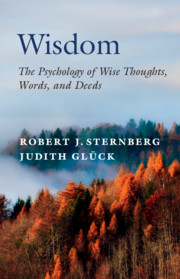Book contents
- Wisdom
- Wisdom
- Copyright page
- Dedication
- Contents
- Figures and Table
- Preface
- 1 What Is Wisdom?
- 2 Why Is Wisdom Important and Why Doesn’t Society Always See It That Way?
- 3 How Has Wisdom Been Studied in Psychology?
- 4 How Is Wisdom Measured?
- 5 How Does Wisdom Develop?
- 6 How Do We Cultivate Wisdom?
- 7 How Is Wisdom Related to Other Psychological Characteristics?
- 8 Am I Wise?
- Epilogue
- Index
5 - How Does Wisdom Develop?
Published online by Cambridge University Press: 07 October 2021
- Wisdom
- Wisdom
- Copyright page
- Dedication
- Contents
- Figures and Table
- Preface
- 1 What Is Wisdom?
- 2 Why Is Wisdom Important and Why Doesn’t Society Always See It That Way?
- 3 How Has Wisdom Been Studied in Psychology?
- 4 How Is Wisdom Measured?
- 5 How Does Wisdom Develop?
- 6 How Do We Cultivate Wisdom?
- 7 How Is Wisdom Related to Other Psychological Characteristics?
- 8 Am I Wise?
- Epilogue
- Index
Summary
This chapter reviews theoretical models and empirical evidence about the development of wisdom. Wisdom does not automatically come with age: many people grow very old without becoming very wise! Studies show that the relationship between wisdom and ages varies somewhat between different measures of wisdom, but there seems to be a growing consensus that very wise people tend to be in their late middle age – say, between age 50 and 70. Some reasons why this life phase may be particularly rich in wisdom are discussed. Then, theories about pathways to wisdom are reviewed. The MORE Life Experience Model proposes that life challenges are catalysts for the development of wisdom, and that certain psychological resources – openness, reflectivity, emotional sensitivity and emotion regulation, and management of uncertainty and uncontrollability – enable some individuals to grow wiser from the challenges they go through.
- Type
- Chapter
- Information
- WisdomThe Psychology of Wise Thoughts, Words, and Deeds, pp. 100 - 127Publisher: Cambridge University PressPrint publication year: 2021

